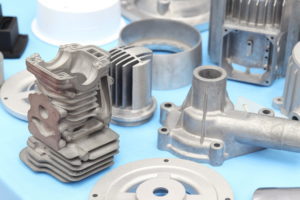Fascination About Stahl Specialty Company
Fascination About Stahl Specialty Company
Blog Article
The Greatest Guide To Stahl Specialty Company
Table of Contents3 Easy Facts About Stahl Specialty Company ExplainedSome Ideas on Stahl Specialty Company You Need To KnowThe 2-Minute Rule for Stahl Specialty CompanySome Ideas on Stahl Specialty Company You Need To KnowThe Facts About Stahl Specialty Company Revealed
The refined distinction hinges on the chemical content. Chemical Contrast of Cast Light weight aluminum Alloys Silicon advertises castability by decreasing the alloy's melting temperature level and boosting fluidness throughout spreading. It plays a crucial function in allowing intricate mold and mildews to be filled up accurately. Furthermore, silicon adds to the alloy's strength and wear resistance, making it valuable in applications where durability is important, such as auto parts and engine elements.It likewise boosts the machinability of the alloy, making it simpler to process into completed items. In this method, iron adds to the general workability of light weight aluminum alloys. Copper enhances electric conductivity, making it beneficial in electrical applications. It likewise improves rust resistance and includes in the alloy's overall toughness.
Manganese adds to the toughness of aluminum alloys and improves workability. It is commonly used in functioned light weight aluminum products like sheets, extrusions, and profiles. The visibility of manganese aids in the alloy's formability and resistance to breaking throughout manufacture procedures. Magnesium is a light-weight component that supplies stamina and influence resistance to light weight aluminum alloys.
Zinc boosts the castability of aluminum alloys and helps control the solidification procedure during spreading. It improves the alloy's toughness and solidity.
3 Simple Techniques For Stahl Specialty Company
Due to the fact that aluminum-silicon alloys have excellent casting residential or commercial properties, high gas residential or commercial properties, straightforward processes, and exceptional rust resistance, aluminum-silicon alloys are most commonly made use of in the die-casting market in the house and abroad. At the very same time, aluminum-silicon alloys are likewise relatively early and extensively identified alloys created and utilized in die-casting. After continuous research and enhancement, many of the present global mainstream aluminum-silicon alloys have actually been finalized and are absolutely nothing more than A356, A360, A380, ADC12, B390, and A413.
The main thermal conductivity, tensile stamina, yield stamina, and prolongation differ. Select ideal resources according to the performance of the target product produced. Among the above alloys, A356 has the highest possible thermal conductivity, and A380 and ADC12 have the most affordable. The tensile limitation is the opposite. A360 has the ideal return strength and the highest prolongation rate.

Stahl Specialty Company for Beginners
In accuracy casting, 6063 is appropriate for applications where intricate geometries and top quality surface coatings are vital. Examples consist of telecommunication rooms, where the alloy's exceptional formability permits for smooth and visually pleasing styles while maintaining architectural stability. In a similar way, in the Lighting Solutions industry, precision-cast 6063 components create elegant and effective lighting fixtures that call for complex forms and excellent thermal performance.
(https://allmyfaves.com/stahlspecialc?tab=Stahl%20Specialty%20Company)
It brings about a better surface area finish and far better rust resistance in A360. The A360 exhibits remarkable elongation, making it optimal for complicated and thin-walled elements. In precision spreading applications, A360 is well-suited for industries such as Consumer Electronic Devices, Telecommunication, and Power Devices. Casting Foundry. Its enhanced fluidity allows for detailed, high-precision elements like smart device cases and communication tool real estates.

In accuracy casting, light weight aluminum 413 radiates in the Customer Electronics and Power Equipment industries. This alloy's remarkable rust resistance makes it an exceptional selection for exterior applications, making sure lasting, long lasting items in the discussed markets.
More About Stahl Specialty Company
The aluminum alloy you pick will significantly impact both the spreading procedure and the residential or commercial properties of the last product. Due to the fact that of this, you have to make your decision meticulously and take an informed approach.
Identifying one of the most ideal light weight aluminum alloy for your application will suggest evaluating a wide variety of features. These comparative alloy features follow the North American Die Casting Organization's guidelines, and we've separated them into 2 classifications. aluminum metal casting. The first category addresses alloy qualities that influence the production procedure. The second covers qualities affecting the homes of the last product.
The alloy you select for die casting straight affects several facets of the casting process, like exactly how easy the alloy is to collaborate with and if it is vulnerable to casting defects. Hot splitting, also understood as solidification breaking, is a regular die casting flaw for aluminum alloys that can lead to interior or surface-level rips or fractures.
The Of Stahl Specialty Company
Particular aluminum alloys are more vulnerable to warm fracturing than others, and your selection ought to consider this. Another typical defect located in the die casting of aluminum is die soldering, which is when the actors adheres to the die wall surfaces and makes ejection challenging. It can harm both the actors and the die, so you need to try to find alloys with high anti-soldering residential or commercial properties.
Rust resistance, which is currently a noteworthy characteristic of light weight aluminum, can differ significantly from alloy to alloy and is a vital particular to take into consideration depending upon the environmental problems your product will be exposed to. Use resistance is another home typically looked for in aluminum products and can separate some alloys.
Report this page